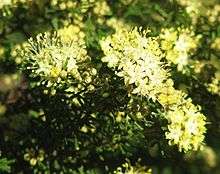Phebalium bullatum
Phebalium bullatum, commonly known as silvery phebalium, desert phebalium[2] or sand phebalium,[3] is a species of shrub that is endemic to southern continental Australia. It is more or less covered with silvery scales and has narrow oblong to narrow wedge-shaped leaves and yellow flowers in umbels of about six.
| Silvery phebalium | |
|---|---|
 | |
| Scientific classification | |
| Kingdom: | Plantae |
| Clade: | Tracheophytes |
| Clade: | Angiosperms |
| Clade: | Eudicots |
| Clade: | Rosids |
| Order: | Sapindales |
| Family: | Rutaceae |
| Genus: | Phebalium |
| Species: | P. bullatum |
| Binomial name | |
| Phebalium bullatum | |
| Synonyms[1] | |
|
Phebalium glandulosum var. bullatum (J.M.Black) Court | |
Description
Phebalium bullatum is a shrub that typically grows to a height of 2 m (6 ft 7 in) and is more or less covered with silvery scales. The branchlets are also covered with warty glands. The leaves are thick, narrow oblong to narrow wedge-shaped, 6–12 mm (0.24–0.47 in) long, 1.5–2 mm (0.059–0.079 in) wide on a short petiole and V-shaped in cross-section. The upper surface of the leaves is glabrous and channelled, the lower surface convex and covered with silvery scales. The flowers are yellow and arranged in umbels of about six, each flower on a pedicel about 5 mm (0.20 in) long. The calyx is hemispherical, about 1.5 mm (0.059 in) long with broad triangular teeth and the petals are broadly elliptical, about 3 mm (0.12 in) long and 2 mm (0.079 in) wide with silvery scales on the back. Flowering occurs from August to October.[4][5][6][7]
Taxonomy
Phebalium bullatum was first formally described in 1916 by John McConnell Black and the description was published in Transactions and prodeedings of the Royal Society of South Australia.[8][9]
Distribution and habitat
Silvery phebalium is found on sandy soils in mallee scrub between the Eyre Peninsula in South Australia and north-western Victoria.[4][6]
References
- "Phebalium bullatum". Australian Plant Census. Retrieved 16 June 2020.
- "Phebalium bullatum". State Herbarium of South Australia. Retrieved 17 June 2020.
- "Phebalium bullatum (Rutaceae)". South Australian Seed Conservation Centre. Retrieved 17 June 2020.
- Wilson, Paul G. (1970). "A Taxonomic Revision of the Genera Crowea, Eriostemon and Phebalium (Rutaceae)". Nuytsia. 1 (1): 76–77. Retrieved 17 June 2020.
- Wilson, Paul G. "Phebalium bullatum". Australian Biological Resources Study, Department of Agriculture, Water and the Environment, Canberra. Retrieved 17 June 2020.
- Duretto, Marco. "Phebalium bullatum". Royal Botanic Gardens Victoria. Retrieved 17 June 2020.
- Costermans, L. (1981). Native Trees and Shrubs of South-eastern Australia. Australia: Rigby. ISBN 072701403X.
- "Phebalium bullatum". APNI. Retrieved 17 June 2020.
- Black, John McConnell (1916). "Additions to the Flora of South Australia. No. 10". Transactions and Proceedings of the Royal Society of South Australia. 40: 460–461. Retrieved 17 June 2020.